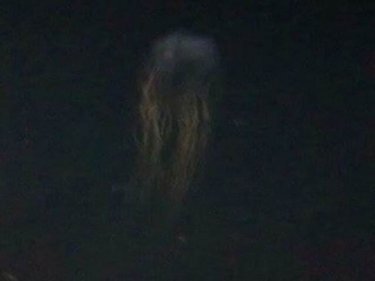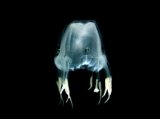PHUKET: A second deadly box jellyfish has been sighted in the sea off a beach at Phangan island, where a tourist was killed by toxic tentacles on Friday evening.
More research is needed to determine how far the extremely dangerous jellyfish have spread around the Gulf of Thailand, noted environmentalist Thon Thamrongawasawat said today.
The box jellyfish believed to have killed Bangkok tourist Chayanan Surin, 31, as she swam in early evening darkness was later washed up at Rin beach.
All of its tentacles had been ripped off - presumably by Khun Chayanan as she struggled in the water.
She and her friends were on Phangan to enjoy the monthly full moon party when the box jellyfish struck. It's now a matter of determining how widespread the ''boxies'' are in Gulf waters.
A warning has already been given that tourists should avoid swimming after dark, particularly following downpours.
The photograph of the second box jellyfish, taken off the beach where Khun Chayan died, is likely to bring more intense research to determine danger areas.
Common vinegar is the only treatment that reduces the toxicity after box jellyfish stings, according to experts. It's not known whether vinegar was applied on the welts that encircled Khun Chayan's torso and an arm.
A box jellyfish killed a young French boy on the island in August last year.
Thai authorities say they will remain honest and forthright with the public about the dangers posed by box jellyfish. Authorities in neighboring Malaysia, where more deaths have been recorded, are more coy about the issue and have turned to Thailand's marine biologists for help.
The box jellyfish is one of the world's most poisonous creatures. The transparent cube-shaped jellyfish's sting can cause extreme pain, muscle numbness, stomach and back muscle spasms, nausea, vomiting, chest tightness and death.
Smaller versions of the ''boxie'' can be found at a bay on Phuket's east coast but biologists studied the tiny creatures and determined they are not capable of causing serious injury or death.
With the Isthmus of Kra separating the Gulf of Thailand from the Andaman Sea, Phuket's popular west coast beaches remain free from dangerous jellyfish.
More research is needed to determine how far the extremely dangerous jellyfish have spread around the Gulf of Thailand, noted environmentalist Thon Thamrongawasawat said today.
The box jellyfish believed to have killed Bangkok tourist Chayanan Surin, 31, as she swam in early evening darkness was later washed up at Rin beach.
All of its tentacles had been ripped off - presumably by Khun Chayanan as she struggled in the water.
She and her friends were on Phangan to enjoy the monthly full moon party when the box jellyfish struck. It's now a matter of determining how widespread the ''boxies'' are in Gulf waters.
A warning has already been given that tourists should avoid swimming after dark, particularly following downpours.
The photograph of the second box jellyfish, taken off the beach where Khun Chayan died, is likely to bring more intense research to determine danger areas.
Common vinegar is the only treatment that reduces the toxicity after box jellyfish stings, according to experts. It's not known whether vinegar was applied on the welts that encircled Khun Chayan's torso and an arm.
A box jellyfish killed a young French boy on the island in August last year.
Thai authorities say they will remain honest and forthright with the public about the dangers posed by box jellyfish. Authorities in neighboring Malaysia, where more deaths have been recorded, are more coy about the issue and have turned to Thailand's marine biologists for help.
The box jellyfish is one of the world's most poisonous creatures. The transparent cube-shaped jellyfish's sting can cause extreme pain, muscle numbness, stomach and back muscle spasms, nausea, vomiting, chest tightness and death.
Smaller versions of the ''boxie'' can be found at a bay on Phuket's east coast but biologists studied the tiny creatures and determined they are not capable of causing serious injury or death.
With the Isthmus of Kra separating the Gulf of Thailand from the Andaman Sea, Phuket's popular west coast beaches remain free from dangerous jellyfish.











Why don't the thai authorities consult with their Australian counterparts as we've had to live / deal with the box jelly in Australia for many years now.
Posted by DG on August 3, 2015 13:34
Editor Comment:
There have been consultations in the past and Thailand's marine biologists are regularly in communication with peers in Australia.